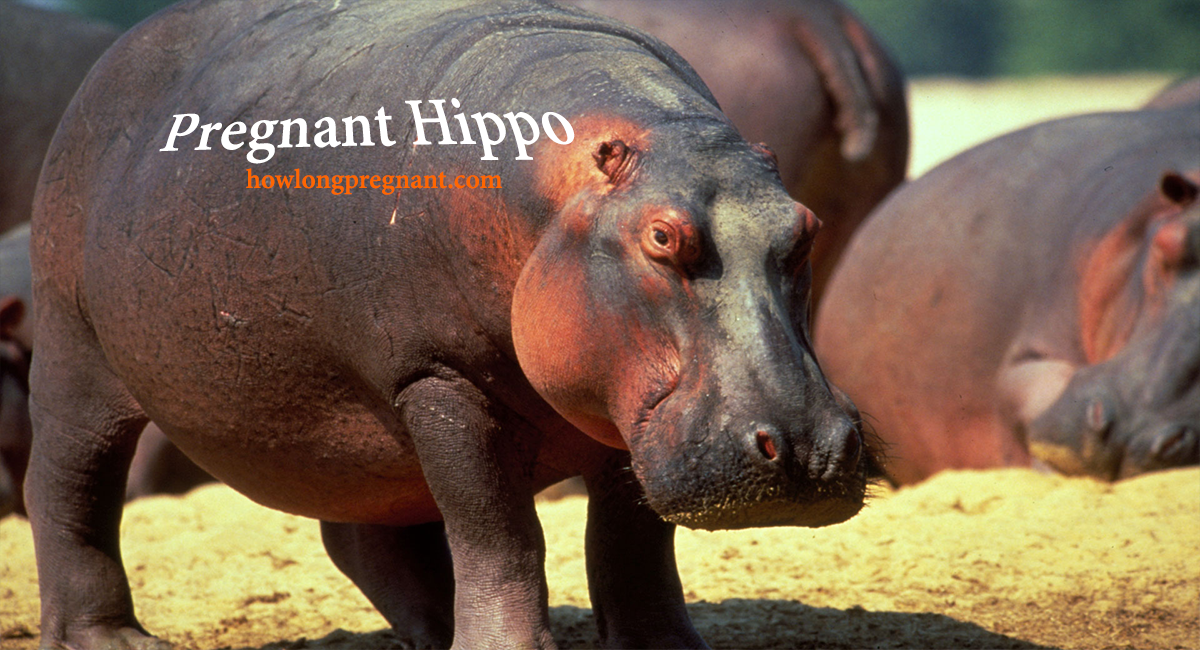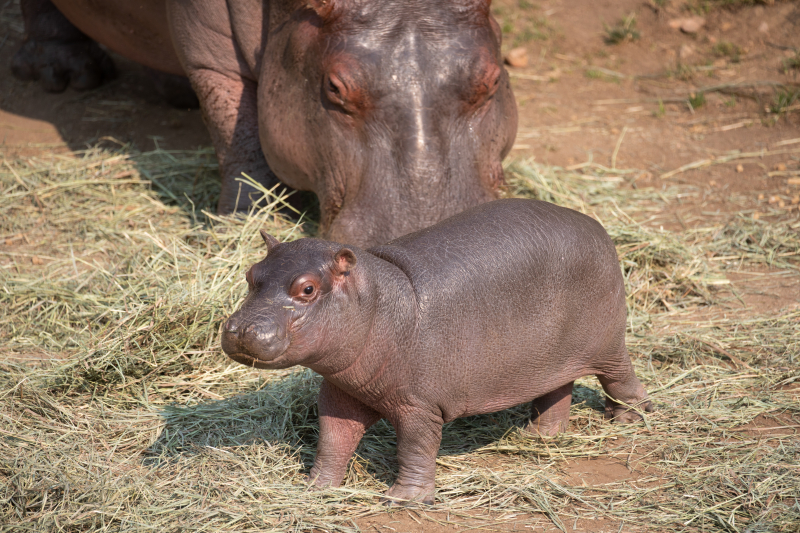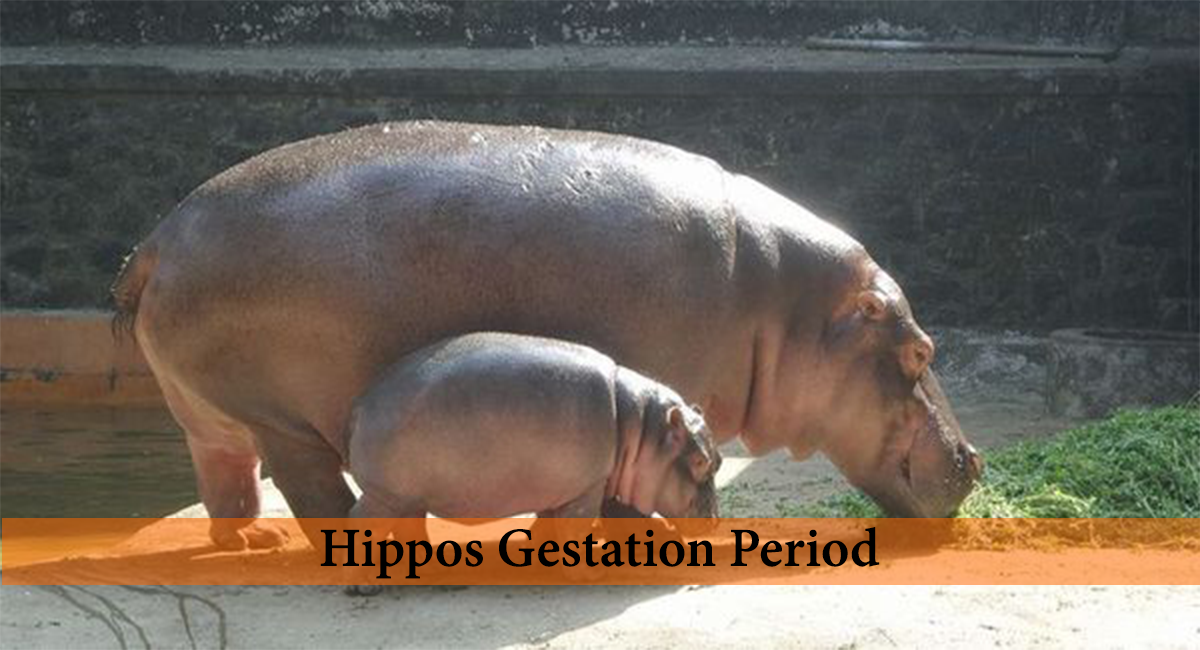Hippos are extraordinary and exceptional animals known for their gigantic size, bizarre behavior and ecological role they play. These mammals that prefer semi-aquatic habitats are found mainly in sub-Saharan Africa regions’ rivers and lakes.
Their weight may reach 3300 pounds due to which they have strong jaws and a territorial nature. Hippos, despite their fierce appearance, also make interesting case studies concerning social life as well as reproductive behavior.
Pregnancy and gestation periods of hippos are among the most fascinating aspects of these animals. For around eight months, the “Hippo Gestation Period” is an amazing occurrence through which these graceful creatures get ready to bring forth young ones.
This article will talk about hippopotamus pregnancies: the pregnancy duration, different gestation stages and how mothers take care of young ones while they are expecting. The duration of a hippo’s pregnancy reveals some aspects of its life cycle as well as remarkable ways in which it thrives within its habitat. Join us today as we unfold the secrets behind the time between conception and birth for hippos!
The Basics of Hippo Reproduction
Their survival and social structure depend on hippos, or Hippopotamus amphibius, having a unique reproductive cycle. Unlike most animals, hippos do not have a particular mating season although most births are observed beginning when water levels rise early in the rainy season. Water is where mating occurs, with dominant males guarding their territories fiercely to get the chance to mate with females.
This allows for the development of strong calves that have an approximately 8-month gestation period. Cows who are pregnant continue their normal activities but may become increasingly reserved as birth approaches. Usually, newborns weigh between 55 and 120 pounds and are delivered in water which provides them with protection and flotation. Newborn hippos can swim right away and often rest themselves on their mother’s back for buoyancy.
About a year and half is spent by mothers nursing their young ones and gradually getting them to eat solid food. The young are provided with sheltered learning experiences by pods which are social groups for hippos. The way they nurture one another makes sure that these creatures can raise offspring properly while this takes place within a certain social arrangement.
Hippo Gestation Period
Approximately eight months is the length of a hippo gestation period, during which there are considerable changes in the life cycle of Hippopotamus amphibius. At this time, the pregnant female carries its developing calf and supplies it with food and security. The 240-day gestation often culminates to giving birth at the onset of the rainy season when high water levels make newborns more secure.
During pregnancy, the calf grows rapidly and comes out relatively well-developed and able to swim. In late pregnancy, she may carry on as usual but become increasingly solitary. Births usually happen underwater where buoyancy reduces predation risk.
Newborn calves weigh between 55-120 lbs and can swim right after birth, often hanging onto their mothers’ backs for support. For about eighteen months, she nurses her young one by offering basic health care services that maintain their bond.
She is a very protective mother who does not let her offspring go far from sight because it might be unsafe within the herd. This particular gestation phase demonstrates some remarkable adaptations as well as behaviors that help hippos survive in their native environment
Hippo Species and Their Gestation Period
In order to see how long it takes them to deliver, the species of different hippopotamuses will be considered. This indicates that there may be some slight differences among the species despite the fact that its average length of pregnancy is around 240-250 days.

| Hippo Species | Gestation Period |
|---|---|
| Common Hippopotamus | Approximately 8 months |
| Pygmy Hippopotamus | Around 6 to 7 months |
| Nile Hippopotamus | Approximately 8 months |
| Malagasy Hippopotamus | Approximately 7 to 8 months |
Factors Influencing the Length of Hippo Pregnancy
There are some factors upon which the length of hippo pregnancy depends. The major factor is the health and nutrition of the pregnant animal. A well-fed and healthy hippopotamus has a shorter gestation period than one that is either malnourished or ill. In addition, there are other environmental factors like food and water availability, which can change the duration of pregnancy.
Below are some examples contributing to how long hippo pregnancies last:
Health and Nutrition
Whether these two conditions are good in a pregnant hippo affects how long it takes for her to deliver her baby. For instance, while a well-nourished and healthy female has a shorter pregnancy period; malnutrition or illness will extend this time.
Environmental Conditions
Another way through which animal growth can be accelerated is through environmental factors. The presence of enough food resources and appropriate habitat conditions may lead to faster fetus development hence shorter periods of pregnancy.
Genetic Factors
Each of them takes a different amount of time to make a baby hippopotamus since all of them are genetically diverse. Besides, apart from fertility physiology and the developing fetus, several other genetic factors might also affect the period taken for delivery.
Reproductive History
The previous pregnancies that a female hippo has had will affect how long the next ones take. Perhaps those who have had children before may not stay pregnant for so long.
Stress Levels
Pregnancy duration in hippos can change depending on the amount of stress encountered. Disturbance or environmental changes that lead to higher levels of stress may result into prolonged pregnancy.
Species Differences
Some species or subspecies of hippos may have slightly distinguishing lengths of gestation periods. For instance, pygmy hippos’ (Choeropsis liberiensis) pregnancies are shorter than normal hippos’ (Hippopotamus amphibius).
Note: Check other animal’s gestation periods and pregnancy information here
How can you tell if a Hippo is pregnant?
Determining whether a hippopotamus is expectant is difficult due to its large size and water habitat, but there are some indicators that can reveal this. Physically, it is exhibited by the increasing size of the abdomen and gaining weight as pregnancy advances.
Furthermore, expectant hippos may undergo changes in behavior such as seclusion and improved appetite. In addition to that, veterinary methods like ultrasound imaging can confirm visually if a hippopotamus is pregnant by detecting the developing embryo.
Experienced veterinarians also resort to palpation and can disclose the existence of the fetus through abdominal exploration. The use of hormone testing involving blood samples with progesterone levels may indicate pregnancy. Such activities as spending more time in one place or preparing a hidden place for giving birth might be observed while gravidity occurs.
A combination of these techniques, especially together with veterinary skills will provide a reliable indication of whether a female hippo is expecting or not thereby ensuring proper care and management for both her and the baby.
Care and Nutrition for a Pregnant Hippo
In order to ensure a healthy mother and calf, pregnancy care including feeding and nutrition is very important. Grasses, water plants, hay and pelleted diets designed for this purpose are some of the essential nutrients needed by a pregnant hippo.
It is necessary to increase food quantity during pregnancy in order to meet the higher energy demands as well as provide clean fresh water always so that there is no dehydration. Stress-free environment can be created by giving large, pleasant spaces with water for swimming and shaded areas for resting.
To help facilitate healthy pregnancies, regular veterinary check-ups including ultrasound examinations should be carried out since they are useful in detecting any problems early enough that can occur due to this stage of life. Keeping the mind busy and engaged requires environmental enrichment such as novel items or social interaction with other hippos during pregnancy.
By ensuring these bases are covered, caregivers will take good care of the expectant mothers thus contributing to successful pregnancies resulting in the birth of healthy offspring.

How many offspring do Hippos have?
The calving process of a hippo commonly results in one calf although twin births are occasional. For instance, less than 1% of all pregnancies involving hippos result in twins being born. The large size of the baby hippos and the tough task of giving birth to them and taking care of multiple young ones at the same time makes twin deliveries rare for most mothers.
This is why many pregnant hippos will never have more than one baby. For up to 18 months after its birth, a newborn hippopotamus receives intensive nursing from its mother so that it grows healthy while under her protection as part of a pod or group.
Thus, by focusing on this single offspring only, it becomes possible for the mother to promote the survival of her calf through proper nurturing that can go uninterrupted within the wild.
How often can Hippos reproduce?
One year an adult female hippo has the potential to have a baby. Unlike most animals that mate at particular times of the year, hippos can mate at any time of the year. The gestation period of hippos is about eight months and normally after giving birth, females undergo postpartum estrus.
Dominance among males often leads to differential mating opportunities within a pod of hippos. Other factors such as food availability, water quality and stability of habitats also affect whether or not it is possible for animals to reproduce successfully during any given season.
Even though they may breed annually, there are variations in how often this happens due to these specific reasons. These social dynamics can tell us much about the intricate reproductive strategies that provide insight into those changes that are experienced by these massive herbivores in their reproduction patterns when faced with unpredictable environmental conditions.
How Long Are Hippos in Labor?
Comparatively, hippos have shorter pregnancy lengths than many other mammals. Hippos’ labor usually lasts for 30 minutes to several hours but this may vary depending on factors such as the health of the mother, calf’s size and position and overall progress of delivery.
During childbirth, discomfort, restlessness and sounds from her throat can be seen in a female hippo. The baby hippo is protected by its mother after birth, taking it up immediately helping it to rise on its legs, and guiding it towards the water for its safety.
Although they give birth quickly, hippos deliver in water so that if there are any predators around the buoyancy will carry off the newborn calf from harm. On the whole, hippos have a relatively short time of labor since their reproductive processes are efficient thus adapting well into their aquatic lifestyle.
FAQs about Hippo Gestation
How long do hippos stay pregnant?
Normally, hippos take between 240 and 250 days to give birth or nearly eight months. But it may extend for up to three hundred days in some cases.
Can the hippo’s gestation period change?
Yes, a female hippo’s gestational period can change. The time it takes before a pregnant hippopotamus delivers its baby may be affected by factors such as its good health welfare and nutrition as well as environment. Undernourished and diseased ones have longer gestations than healthy and well-fed ones.
Are there any visible signs that show that a hippo is pregnant?
Hippos do not exhibit some external signs of pregnancy like humans do with their bellies swelling.. Nevertheless, one can observe behavior changes that could indicate a pregnant state. For example, expecting hippos might become more territorial, go into nesting mode which includes gathering materials to build nests out of sticks or grasses near water bodies (making them look like birds), be aggressive or even spend the most time in the water to reduce stress on their bodies.
Are there specific seasons for breeding among Hippos?
Hippos don’t have a particular mating season; they are able to mate and conceive all year round but researchers have noted certain periods such as rainy seasons when there is abundant food and water leading to increased mating activities taking place.
How many babies does a hippo usually give birth to?
Normally one calf at a time is born to hippos. There are only rare instances of twin births. The mother protects her newborn calf since she feeds it until the baby grows older enough to join other members in the group.
Conclusion
It takes about eight months for a hippopotamus to gestate, which is one way of illustrating how superb they are as creatures. To better protect this vulnerable species, it is important to understand the basic principles that affect their pregnancy period and observe some signs of such behavior, thus helping the researchers and conservationists as well.
By investigating the reproductive biology of hippos, we become more aware of nature’s marvels and also come to appreciate just how complex life is.

